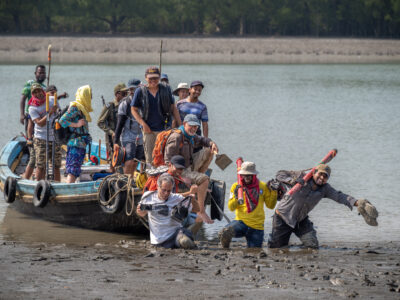
Circle of Blue recently reported on the results of a survey of sustainability experts, and listed their top 19 solutions to the world’s freshwater crisis. The survey was done by GlobeScan, a corporate affairs research firm, and SustainAbility, a strategy consultancy. Respondents, drawn from five sectors — corporate, government (including multi-lateral institutions), NGOs, institutional (e.g., academics) and service (e.g., consultants, media), were asked “What are the technologies or changes in behavior which show the most promise for addressing water shortages over the next 10 years?” They said:
1. Educate to change consumption and lifestyles
2. Invent new water conservation technologies
3. Recycle wastewater
4. Improve irrigation and agricultural practices
5. Appropriately price water
6. Develop energy efficient desalination plants
7. Improve water catchment and harvesting
8. Look to community-based governance and partnerships
9. Develop and enact better policies and regulations
10. Holistically manage ecosystems
11. Improve distribution infrastructure
12. Shrink corporate water footprints
13. Build international frameworks and institutional cooperation
14. Address pollution
15. Public common resources/equitable access
16. R&D/Innovation
17. Water projects in developing countries/transfer of technology
18. Climate change mitigation
19. Population growth control
These answers all sound very familiar, which I take as a good thing. This survey was done for part of a report that companies can purchase for guidance on sustainability. It’s great that these messages are being delivered to corporations, as they have a lot of power to bring about change.
Read the full article here.




what about longer pipes?
I would like to solve the problem for all water crisis so that is why I am on here.
We waste our supply of fresh water every day. We don’t recycle it. We are concerned of climate change and sea level rise; but are not hitting the mark of combating it. The need to think big and come up with a winning answer draws near for many coastal areas. I believe there may be a solution in constructing seawalls and locks at the mouth of bays and seas. Openings that are manageable with tremendous reward, such as the Mediterranean and Red Sea. New engineering practices could be utilized for smart seawalls to reduce mother nature’s wrath and increase wave energy and possibly freshwater collection. Over time the Mediterranean and other adjoining Seas would drop in salinity and require less effort to make their water potable. This would prove as a big boon for irrigation in North Africa, and controlled sea level rise for places like Venice Italy.
https://www.engadget.com/2016/07/27/solar-powered-machine-turns-urine-into-drinkable-water/ recycle pee
I am very curious about fresh water scarcity in the world. Some of the countries are facing this problem and will face more next in the upcoming years. Do more afforestation can solve this problem?
Afforestation helps a lot of things, including the climate change that is drying up the world..
we could get fresh water from the polar ice caps but we risk the threat of global warming and turning some species extinct
Keeping enough volumes for environmental flows, improved irrigation practices and artificially ground water recharge would help maintain water cycle balance in the long term. Water demand is ever increasing while supply is dwindling and reaching an equilibrium for now and for future generations
Where is the most fresh water in the world? In all the glaciers of the world that are all melting at a very fast rate. It doesn’t matter who’s responsible it is free clean water. A pipeline not for oil but for water is the answer. If we could tap into this supply of water then pipe it to the underground water supply in the Midwest and Lake Mead and any drought prone areas. I believe that millions of gallons of water are just flowing into the seas and oceans of the world raising the level of both and just being wasted. You can live without oil but you can not live without water. We have plenty of water just for the taking.
Yes there is also deep water sources in crystal section in all areas
4. Improve irrigation and agricultural practices –
Well, no one likes to talk about water loss in existing water networks. Old pipes and poor maintenence causing water loss in such big numbers that it’s almost immpossible to figure.